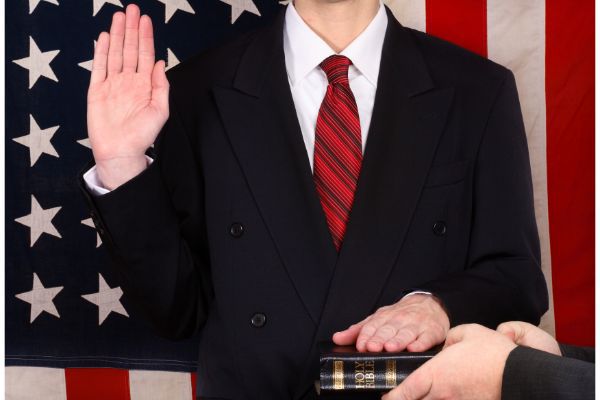California Attorney Misconduct Law
California Attorney Misconduct and Malpractice: Laws, Rules, Ethics, and Moral Turpitude
Many people aren’t aware that the California Supreme Court is responsible for the conduct – and misconduct – of all the lawyers in California.
“The California Supreme Court has the exclusive power to regulate attorney admission to practice law in California and has inherent powers to discipline and and disbar members of the California Bar. The Supreme Court has delegated to the State Bar the power to act on its behalf in admission, disciplinary, and other matters, subject to the Supreme Court’s review. However, the Supreme Court retains its power to control any disciplinary proceeding at any step and its judicial authority to disbar or suspend attorneys.”
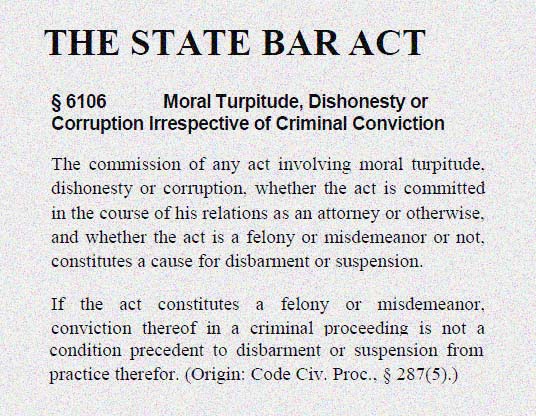 |
| California Business and Professions Code § 6106 |
§ 6106
California Business and Professions Code 6106 – The commission of any act involving moral turpitude, dishonesty or …
The commission of any act involving moral turpitude, dishonesty or corruption, whether the act is committed in the course of his relations as an attorney or otherwise, and whether the act is a felony or misdemeanor or not, constitutes a cause for disbarment or suspension.
If the act constitutes a felony or misdemeanor, conviction thereof in a criminal proceeding is not a condition precedent to disbarment or suspension from practice therefor.
Terms Used In California Business and Professions Code 6106
- Conviction: A judgement of guilt against a criminal defendant.
- Precedent: A court decision in an earlier case with facts and law similar to a dispute currently before a court. Precedent will ordinarily govern the decision of a later similar case, unless a party can show that it was wrongly decided or that it differed in some significant way.
Click here for the State Bar of California webpage about making a complaint against an attorney. Click here for the State Bar attorney ethics information webpage.
The State Bar also provides the public an exhaustive, 456-page directory of decisional law and other references addressing virtually every type of unethical attorney conduct. The directory is called the California Compendium on Professional Responsibility [pdf]. To download the Compendium, click here [pdf]. For the State Bar Compendium webpage, click here. SFCR often uses the compendium as a resource in reporting on allegations of attorney misconduct. Other references we rely on are described in this post from 2011. Click here.This page provides news you can use about California laws that apply to attorneys in the common family court situations we report on. If you have a news tip about an unethical family law attorney, please contact us using our Contact Family Court News page, or click here to send us an email. Before contacting us with a news tip about attorney misconduct, please review the information below.
Attorney Rules of Professional Conduct, State Ethics Laws
A“misleading silence” is not distinguishable from a false statement, according to the State Bar, and this principle dates back to at least 1929. All these forms of deception are considered fraud upon the court, or fraud on the court. “False statement of fact,” “explicit false statement” or “affirmative misrepresentation” are the legal, technical terms for what the general public refers to as a lie.
When attorneys file papers in court, under California law they are required to tell the complete truth whether or not the paperwork is filed under penalty of perjury. Under California law, telling only part of the truth in any court filing by an attorney is the same as telling a lie, and withholding, concealing, or omitting relevant information in court filings is the same as telling a lie. And is considered fraud on the court, according to the State Bar.
As “officers of the court,” lawyers must disclose in court filings and in argument before a judge the facts, law and other authorities harmful or adverse to their position, in addition to the facts, law and authority supporting their position. The failure to disclose adverse facts and authority is unlawful, unethical, and considered sanctionable misconduct, according to the State Bar.
As members of the State Bar and officers of the court, attorneys are required to be honest at all times, even when off-duty and not acting as a lawyer. Dishonesty, whether or not committed while acting as an attorney, is considered an act of moral turpitude and is prohibited by Business and Professions Code § 6106, according to the State Bar.
It is illegal for a lawyer to mislead or make misrepresentations to an opposing attorney or party, including a self-represented litigant. Making offensive references or descriptions about an opposing party or attorney also is unlawful, according to the State Bar. Business and Professions Code § 6128 criminalizes deceit by an attorney intended to deceive a judge or any party.
another case to learn from is:
Sturr v. State Bar , 52 Cal.2d 125
This is a proceeding to review the recommendation of the Board of Governors of The State Bar of California that petitioner be suspended from the practice of law for a period of five years. The Board of Governors found that petitioner (1) violated his oath and duties as an attorney and counselor at law, (2) committed acts involving moral turpitude and dishonesty within the meaning of section 6106 of the Business and Professions Code, fn. 1 and (3) violated rules [52 Cal.2d 127] 9 and 12 of the Rules of Professional Conduct of The State Bar. fn. 2
Questions: First. Did petitioner violate (1) his oath and duties as an attorney and counselor at law, (2) section 6106 of the Business and Professions Code, and (3) rules 9 and 12 of the Rules of Professional Conduct of The State Bar?
Yes. These rules are here applicable:
[1] 1. In a disciplinary proceeding against an attorney, findings of fact by local administrative committees and the Board of Bar Governors are not binding on the Supreme Court, which will weigh and pass upon the sufficiency of the evidence to sustain the findings of the board.
[2] 2. The burden is upon the petitioner seeking a review of the Board of Bar Governors’ recommendation to show that its findings are not supported by the evidence or that its recommendation is erroneous or unlawful. (Tonini v. State Bar, 46 Cal.2d 491, 492 [1], [2] [297 P.2d 1]; Clark v. State Bar, 39 Cal.2d 161, 165 [1], [2] [246 P.2d 1].)
[3] Applying the foregoing rules, the record in the instant proceeding discloses that petitioner was admitted to the practice of law in California on June 12, 1951, and is and at all times herein mentioned was a member of The State Bar.
Moral Turpitude: Deceit, Dishonesty, Half-Truths
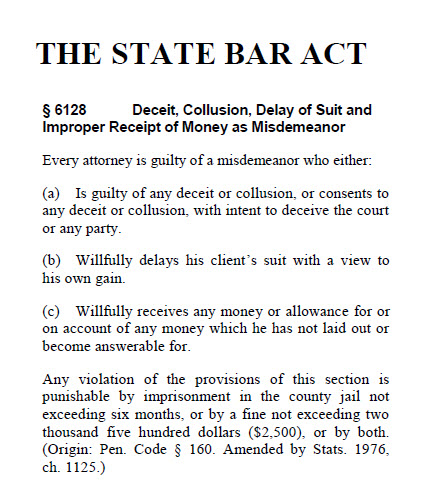 |
| California Business and Professions Code § 6128 |
An instructive summary of what moral turpitude includes is provided by the State Bar Court decision, In the Matter of Maloney and Virsik:
“[The attorneys] committed acts of moral turpitude in wilful violation of section 6106 by knowingly making repeated misrepresentations to the Superior Court. It is well established that acts of moral turpitude include an attorney’s false or misleading statements to a court or tribunal…The actual intent to deceive is not necessary…Acts of moral turpitude include concealment as well as affirmative misrepresentations…
[N]o distinction can be drawn among concealment, half-truth, and false statement of fact…Also, it is not necessary that [the attorneys] actually succeeded in perpetrating a fraud on the court…These [court] pleadings were permeated with half-truths, omissions, and outright misstatements of fact and law. The Supreme Court has denounced such misleading conduct and has not hesitated to impose discipline in such cases.”
Click here to view this portion of the decision. Click here to view the complete Maloney and Virsik decision. Other moral turpitude references and authorities are provided at the bottom of this post.
Under state law, it is mandatory that a judge take action when an attorney commits misconduct. A judge’s duty to take corrective action is not discretionary. Canon 3D(2) of the Code of Judicial Ethics – the ethical rules for judges – requires all judges to take appropriate corrective action when a lawyer violates professional standards. Click here to view Canon 3D(2).Under its inherent power, the California Supreme Court has the authority to discipline attorneys for misconduct not covered by statutes, the Rules of Professional Conduct, or other authority. Click here.
Attorney Ethics Laws and Authorities in California
Whether they are under oath or not, attorneys are required by state law to tell the truth in court:
- Mosesian v. State Bar (1972) 8 Cal.3d 60, 66. Click here.
- In the Matter of Maloney and Virsik (2000) 4 Cal. State Bar Ct. Rptr. 774. Click here.
- In the Matter of Chestnut (2000) 4 Cal. State Bar Ct. Rptr. 166, 174. Click here.
- Vapnek et al., Cal. Practice Guide: Professional Responsibility (The Rutter Group) ¶ 8:278-279. Click here.
- Witkin California Procedure 5th Edition, § 495. Click here.
- Business & Professions Code § 6068(d). Click here.
For a one-page list of similar and related authorities from the State Bar California Compendium on Professional Responsibility, click here.
A half-truth is identical to a lie, according to state law and attorney ethics standards:
- In the Matter of Chestnut (2000) 4 Cal. State Bar Ct. Rptr. 166, 174. Click here.
- Grove v. State Bar (1965) 63 Cal.2d 312, 315. Click here.
- Franklin v. State Bar (1986) 41 Cal.3d 700, 709. Click here.
- In the Matter of Maloney and Virsik (2000) 4 Cal. State Bar Ct. Rptr. 774. Click here.
- Cal. Compendium on Prof. Responsibility, 2013, p. 343.
- Business & Professions Code § 6068(d). Click here.
For a one-page list of similar and related authorities from the State Bar California Compendium on Professional Responsibility, click here.
Withholding or concealing material facts or information from a judge during a court hearing or in papers filed with the court is the same as telling a lie, and constitutes fraud upon the court:
- Sullins v. State Bar (1975) 15 Cal.3d 609. Click here.
- In the Matter of Chestnut (Review Dept. 2000) 4 Cal. State Bar Ct. Rptr. 166, 174. Click here.
- Di Sabatino v. State Bar (1980) 27 Cal.3d 159, 162. Click here.
- Grove v. State Bar (1965) 63 Cal.2d 312, 315. Click here.
- Davidson v. State Bar (1976) 17 Cal.3d 570, 573. Click here.
- In the Matter of Downey (2009) 5 Cal. State Bar Ct. Rptr. 151. Click here.
- In the Matter of Maloney and Virsik (2000) 4 Cal. State Bar Ct. Rptr. 774. Click here.
- In re Lincoln (1929) 102 Cal.App. 733, 741. Click here.
- Cal. Compendium on Prof. Responsibility, 2013, pp. 58, 343, 425, 426.
- Business & Professions Code § 6068(d). Click here.
For a one-page list of similar and related authorities from the State Bar California Compendium on Professional Responsibility, click here.
Even where the attorney did not intend to deceive the court, and even where no harm results from an attorney deceiving a judge at a court hearing or in papers filed in court, it is unlawful for an attorney to deceive a court:
- In the Matter of Chestnut (2000) 4 Cal. State Bar Ct. Rptr. 166, 174. Click here.
- Codiga v. State Bar (1978) 20 Cal.2d 788, 709. Click here.
- Giovanazzi v. State Bar (1980) 28 Cal.3d 465. Click here.
- In the Matter of Maloney and Virsik (2000) 4 Cal. State Bar Ct. Rptr. 774. Click here.
- Business & Professions Code § 6068(d). Click here.
- Cal. Compendium on Prof. Responsibility, 2013, pp. 420, 422, 425.
For a one-page list of similar and related authorities from the State Bar California Compendium on Professional Responsibility, click here.
Even where an attorney unintentionally misleads a court, it is still an unlawful misrepresentation, and the attorney must immediately inform the court of the error and request that it set aside any orders based on the misrepresentation:
- Datig v. Dove Books Inc., 87 Cal. Rptr. 2d 719. Click here.
- Drociak v. State Bar (1991) 52 Cal.3d 1085. Click here.
- Cal. Compendium on Prof. Responsibility, 2013, pp. 59, 168, 197, 198, 203, 422, 425, 426.
For a one-page list of similar and related authorities from the State Bar California Compendium on Professional Responsibility, click here.
Moral Turpitude Acts Catalog
There are more than 100 different actions an attorney can take that under state law are considered acts of moral turpitude. The State Bar of California publishes a list of attorney acts and actions that constitute moral turpitude. Click here to view the list.
Decisions of the California Supreme Court in attorney misconduct cases also provide examples of moral turpitude. Click here. The State Bar Compendium on Professional Responsibility also provides a list of over 20 case law decisions which contain definitions of moral turpitude. Click here. California Practice Guide: Professional Responsibility published by The Rutter Group includes a section with examples and analysis of moral turpitude. Click here.
According to many unrepresented family court litigants, opposing attorneys often withhold, and do not disclose to judges important, but negative information about their clients. Under California law, an attorney who conceals adverse and material facts is guilty of moral turpitude. Click here.
The State Bar moral turpitude list includes the following subjects:
- Advancing untrue facts prejudicial to the opposing party.
- Concealing material information.
- Conspiracy to obstruct justice.
- Duty not to mislead court.
- Acts of deception.
- Defamation.
- Dishonesty.
- Destruction of documents.
- Omission of material facts from documents.
- Encouraging litigation for a corrupt motive.
- Filing false documents.
- Filing false pleadings or statements.
- Fraud.
- Misrepresentation and concealment of adverse and material facts.
- Honesty required in the practice of law.
- Misleading the court.
- Misrepresentations to opposing counsel or pro per.
- Mistake of Law.
- Offensive or disrespectful acts.
- Misleading opposing counsel or pro per.
- Overreaching.
- Perjury.
- Practicing deceit.
NeW RULES OF PROFESSIONAL CONDUCT When it comes to recognizing legal misconduct, we think we "know it when we see it": showing up to court unprepared, blowing a statute of limitations, using offensive language in the courtroom, and similar instances of incompetent and unprofessional behavior. But in terms of legal ethics, the description of professional misconduct is much broader. And beginning Nov. 1 of this year, California lawyers will have an entirely new definition. OLD RULE 1-120 VS. NEW RULE 8.4 California does not currently have a catch-all rule describing professional misconduct. It does, however, in Rule 1-120, contain a small portion of what will be included in a more expansive misconduct rule in November. Current California Rule 1-120, Assisting, Soliciting, or Inducing Violations, is short and sweet: "A member shall not knowingly assist in, solicit, or induce any violation of these rules or the State Bar Act." The State Bar Act includes a body of codified rules in the California Business and Professions Code. New Rule 8.4 added a number of provisions to the rule on professional misconduct. From dishonesty, to criminal behavior, to reckless misrepresentation, its broad scope merits the attention of California lawyers because it covers a wide range of unprofessional behavior. MISCONDUCT AS PROFESSIONAL MISBEHAVIOR
- Rule 8.4 paragraph
(a) is similar to the current rule, stating it is professional misconduct for a lawyer to “violate these rules or the State Bar Act, knowingly assist, solicit, or induce another to do so, or do so through the acts of another.” But the rule goes on to list a number of other types of behavior that constitute legal misconduct, including acts that are both legal and illegal.
Regarding dishonesty, Rule 8.4 paragraph - (b) states that it is misconduct for a lawyer to “commit a criminal act that reflects adversely on the lawyer’s honesty, trustworthiness, or fitness as a lawyer in other respects.” (Emphasis added.)But the very next paragraph,
- (c), extends the language involving dishonesty to non criminal behavior, labeling behavior professional misconduct when it involves “dishonesty, fraud, deceit, or reckless or intentional misrepresentation.”
Paragraph - (d) adds an additional broad category to the misconduct list: conduct that is “prejudicial to the administration of justice.”Rule 8.4 paragraph says
- (e) it is professional misconduct for a lawyer to “state or imply an ability to influence improperly a government agency or official, or to achieve results by means that violate these rules, the State Bar Act, or other law.”Paragraph f adds the last described method of committing misconduct
- (f) for a lawyer to “knowingly assist, solicit, or induce a judge or judicial officer in conduct that is a violation of an applicable code of judicial ethics or code of judicial conduct, or other law.”
(f) states that for purposes of this rule, “judge” and “judicial officer” have the same meaning as in Rule 3.5(c), which contains a list of individuals, some not traditionally classified as judges or judicial officers. It may include- (i) administrative law judges;
- (ii) neutral arbitrators;
- (iii) State Bar Court judges;
- (iv) members of an administrative body acting in an adjudicative capacity; and
- (v) law clerks, research attorneys, or other court personnel who participate in the decision-making process, including referees, special masters, or other persons to whom a court refers one or more issues and whose decision or recommendation can be binding on the parties if approved by the court.
CLARIFYING COMMENTS
Current California Rule 1-120 has no discussion section unlike other current California ethics rules, which include descriptive, clarifying text after the text of the rule. The new Rule 8.4 comment section, in contrast, has plenty to say about its new provisions. Comment 1 specifies when a lawyer can commit misconduct, stating that Rule 8.4 can be violated “when a lawyer is acting in propria persona or when a lawyer is not practicing law or acting in a professional capacity.”
Comment 3 , regarding criminal acts, states that “a lawyer may be disciplined for criminal acts as set forth in Business and Professions Code sections 6101 et seq., or if the criminal act constitutes “other misconduct warranting discipline” as defined by California Supreme Court case law. (_See In re Kelley_ (1990) 52 Cal.3d 487 276 Cal.Rptr. 375 .)”
Comment 4 references California Business and Professions Code Section 6106, which in pertinent part, prohibits “The commission of any act involving moral turpitude, dishonesty or corruption, whether the act is committed in the course of his relations as an attorney or otherwise, and whether the act is a felony or misdemeanor or not, constitutes a cause for disbarment or suspension.”
Comment 4 incorporates much of the language of Section 6106 but adds some additional text. It states, “A lawyer may be disciplined under Business and Professions Code section 6106 for acts involving moral turpitude, dishonesty, or corruption, whether intentional, reckless, or grossly negligent.”
Comment 5 recognizes a Rule 8.4 exception for permissible undercover activity. It states, “Paragraph (c) does not apply where a lawyer advises clients or others about, or supervises, lawful covert activity in the investigation of violations of civil or criminal law or constitutional rights, provided the lawyer’s conduct is otherwise in compliance with these rules and the State Bar Act.”
And finally, Comment 6 states that Rule 8.4 “does not prohibit those activities of a particular lawyer that are protected by the First Amendment to the United States Constitution or by Article I, section 2 of the California Constitution.”
New Rule 8.4 is one of many examples of how significant some of the ethics rule changes will be on Nov. 1. Lawyers are well advised to become familiar with these rules now, in order to continue to maintain thriving legal practices, and handle cases both effectively, and ethically. source
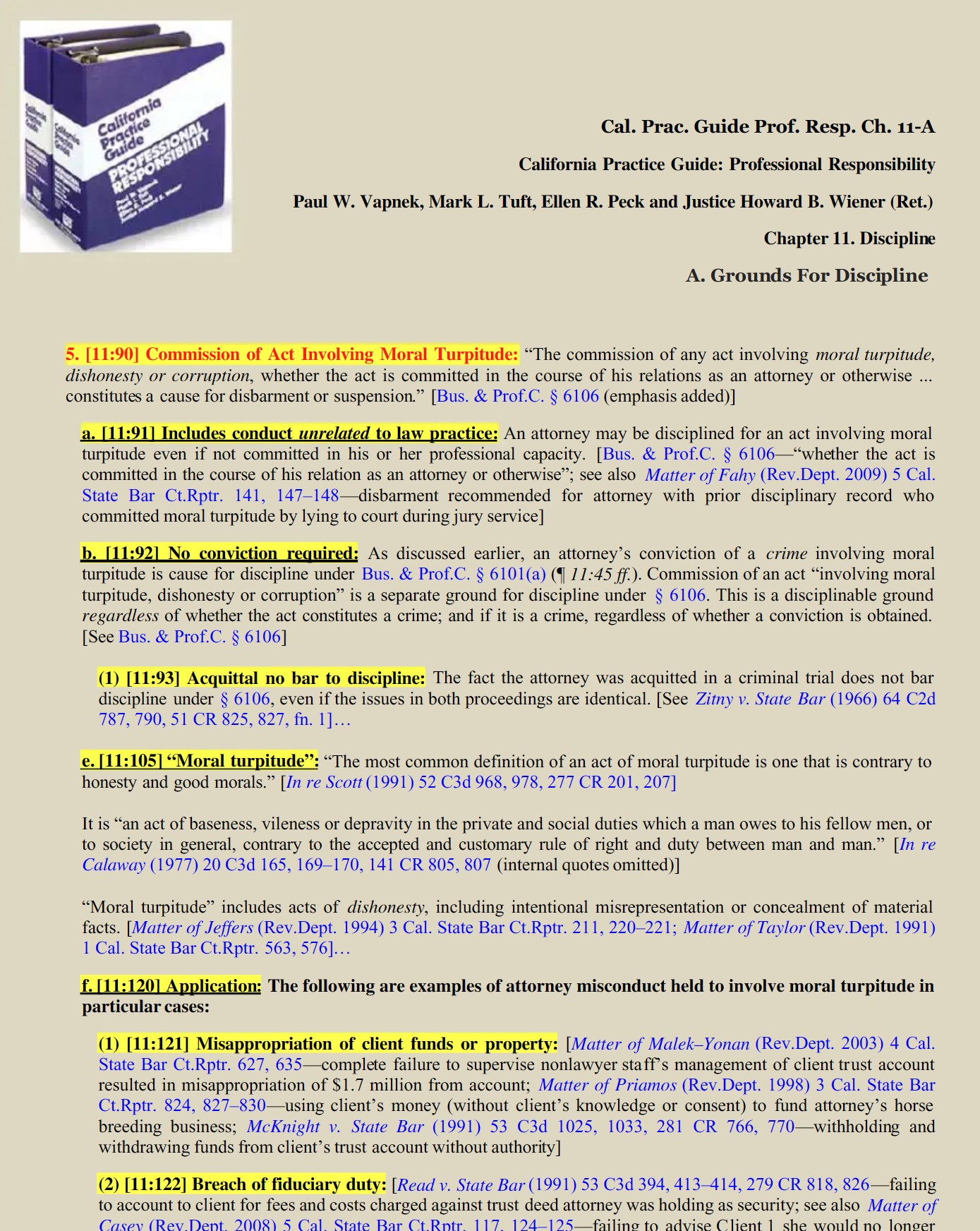
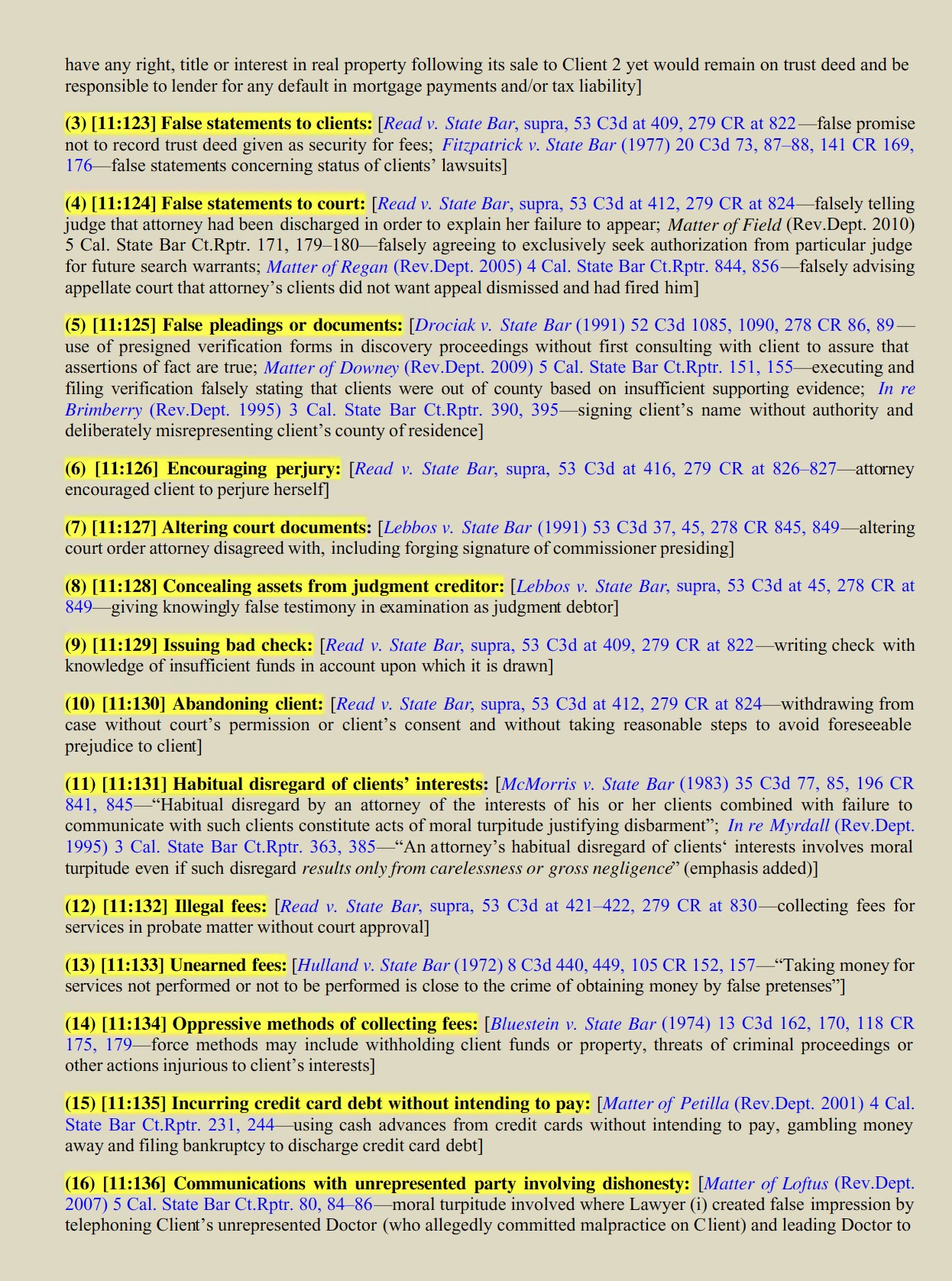
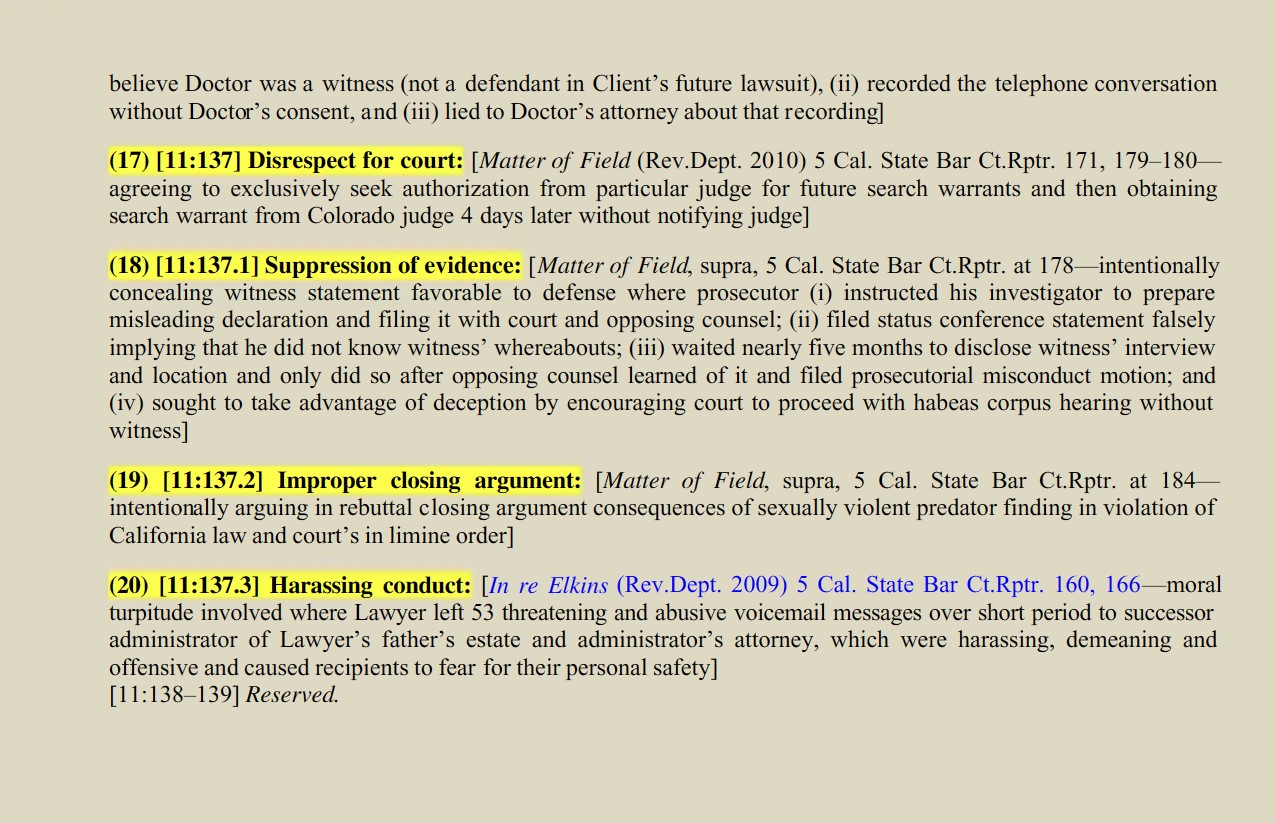
An Attorneys Ethical Duty of Honesty is All-Encompassing
This article discusses an attorney’s ethical duty of honesty not only in all aspects of the law practice but in all personal matters as well. It also presages the California Legislature’s imposition on attorneys the ethical duty to report to the State Bar another attorney’s act of dishonesty.
The Rules of Professional Conduct as well as the State Bar Act are replete with the ethical imperative for attorneys to be honest. The rules include 1.2.1, 3.3, 3.4, 4.1, 7.1 through 7.5 and 8.4; and further implicating the duty of honesty are Business and Professions Code sections 6068 (d), 6106, and 6128. The enforcement tools available to and used by the State Bar include disbarment, suspension, and public reprovals, all of which are a professional death sentence. In a word, the State Bar is empowered to impose the most serious of professional sanctions on counsel for failure to abide by the many rules requiring attorney honesty.
This article will focus on the ethical duty of honesty imposed on attorneys in their handling of negotiations, documenting transactions, and even in their private lives.
We all have been involved in negotiations often times in the context of a settlement conference or mediation. Must an attorney be honest in the course of such negotiations?
A recent opinion issued by the State Bar California Standing Committee on Professional Responsibility and Conduct (COPRAC) Formal Opinion number 2015 – 194 addresses the issue of “when an attorney is engaged in negotiations on behalf of the client, are there ethical limitations on the statements the attorney may make to third parties, including statements that may be considered ‘puffing’ or posturing?” COPRAC’s opinions are advisory only and not binding on the State Bar, although they are often cited by the California Supreme Court and the California State Bar Court in determining whether or not conduct is consistent with the State Bar Act or the Rules of Professional Conduct.
Opinion 2015 – 194 posits a settlement conference where two attorneys engage in exchanges obviously meant to advance their clients’ interests. The hypothetical involves an automobile accident in which plaintiff was injured and seeks compensation for lost income. Undoubtedly all counsel made representations regarding the strength of their respective cases in what any reasonable observer would conclude to be puffery and statements not reasonably to be relied upon. However, plaintiff’s counsel knowing that his client earned $50,000 per year represents that she earns $75,000 a year. Such counsel also knows that his client has found alternative employment and was able to work. Nonetheless, plaintiff’s counsel represents that she is unable to work. Defense counsel, not to be outdone, represents that his client if pushed too hard will file for bankruptcy, knowing that his client is ineligible for such a filing.
COPRAC concludes that both counsel engaged in unethical dishonesty. Such representations go well beyond mere puffery and violate what is now Rule of Professional Conduct 4.1 and Business and Professions Code section 6106, 6128 (a), and possibly 6068 (d) if a judicial officer was in charge of the settlement or mediation conference. The opinion reasons that where there is a false statement of material fact intended to induce reliance by a third-party ethically sanctionable dishonesty has been committed. The opinion also notes that the determination of ethically improper dishonesty does not require the same proof as does fraud, but that the elements overlap.
The drafting of a contract or other such document can, if accompanied with dishonesty, also trigger a State Bar disciplinary proceeding.
Bryant v. State Bar California (1942) 21 Cal. 2d 285 involves an attorney who was suspended for 18 months for having violated Business and Professions code section 6106. Bryant’s dishonesty included his having provided a usurious interest provision in a promissory note, but telling promissor’s counsel that Bryant would not commence an action to enforce the note. Bryant misrepresented his intention. The California Supreme Court in upholding the suspension advised that an attorney must have a blameless moral character; and that Bryant had engaged in moral turpitude; that is, he had committed an act “contrary to justice or honesty.”
The duty of honesty is all-encompassing applicable to an attorney’s private affairs.
Business and Professions Code section 6106 states that “the commission of any act involving moral turpitude, dishonesty or corruption, whether the act is committed in the course of his relations as an attorney, whether the act is a felony or misdemeanor or not, constitutes a cause for disbarment or suspension.”
The COPRAC opinion cites as an example of a matter involving an attorney who commits a dishonest act in his capacity as a private citizen Segretti v. State Bar (1976) 15 Cal. 3rd 878. Mr. Segretti, in acts not committed while he was acting as a lawyer, performed so-called dirty tricks on behalf of Richard Nixon. For example, he prepared and distributed a letter on letterhead entitled Citizens for Muskie (then a candidate for the Democratic nomination for president) accusing Hubert Humphrey and Henry Jackson of sexual improprieties (they too were candidates). Needless to say, Mr. Segretti’s communication was false.
The California Legislature has before it the proposed addition of Business and Professions Code section 6090.8. It provides that “a licensee of the State Bar who knows that another licensee is engaged in professional misconduct that raises a substantial question as to that licensee’s honesty, trustworthiness, or fitness as an attorney in other respects, shall inform the State Bar.” There appears to be a high likelihood that the section will be enacted.
In conclusion, among the many reasons why honesty is in fact the best policy, the State Bar has a wide-ranging mandate to take disciplinary action against attorneys who act dishonestly.
Under California´s New Ethics Rules, Are Lawyers Ever Off The Clock?
Until November 1, 2018, California was the lone hold out state that had not yet adopted some version of the ABA Model Rules. And while we had our own statutes that addressed attorney misbehavior on personal time, we did not formally have our own version of the ABA Misconduct rule.
Now that California has adopted its own version of ABA rule 8.4, Misconduct, it is increasingly apparent that an attorney´s off-the-clock behavior can have on the clock consequences.
As many ethics gurus know, however, California attorneys were already subject to discipline for their behavior when they were not practicing law. Some of the relevant code sections are referenced in California rule 8.4.
Personal Time, Professional Rules
California lawyers have long been governed by California Business and Professions Code section 6106, which permits State Bar discipline for actions involving dishonesty (among other things) whether or not a licensed lawyer is practicing law. New rule 8.4 adopts that language and rationale.
California rule 8.4 states in pertinent part that a lawyer shall not:
“(b) commit a criminal act that reflects adversely on the lawyer’s honesty, trustworthiness, or fitness as a lawyer in other respects;
(c) engage in conduct involving dishonesty, fraud, deceit, or reckless or intentional misrepresentation”
Rule 8.4 Comment [3] states, “A lawyer may be disciplined for criminal acts as set forth in Business and Professions Code sections 6101 et seq., or if the criminal act constitutes “other misconduct warranting discipline” as defined by California Supreme Court case law. Comment [3] cites In re Kelley (1990) 52 Cal.3d 487, a case where a California lawyer was disciplined for picking up a second driving under the influence charge while on probation for the first one.
Rule 8.4 Comment [4] notes the possibility of discipline per Business and Professions Code section 6106 “for acts involving moral turpitude, dishonesty, or corruption, whether intentional, reckless, or grossly negligent.”
So with those guidelines, what exactly are the types of off-the-clock behavior that will land an attorney in ethical hot water? Although the California rule 8.4 Comment section does not elaborate beyond the few references above, ABA Rule 8.4 Comment [2] is more instructive. It recognizes, “Many kinds of illegal conduct reflect adversely on fitness to practice law, such as offenses involving fraud and the offense of willful failure to file an income tax return. However, some kinds of offenses carry no such implication.”
Regarding the differences between the types of offenses referenced, ABA rule 8.4 Comment [2] recognizes the traditional distinction made for offenses involving “moral turpitude.” It defines that concept as including “offenses concerning some matters of personal morality, such as adultery and comparable offenses, that have no specific connection to fitness for the practice of law.”
ABA rule 8.4 Comment [2] continues, recognizing that while a lawyer is responsible for abiding by all tenants of criminal law, “a lawyer should be professionally answerable only for offenses that indicate lack of those characteristics relevant to law practice.” Regarding examples, the Comment notes, “Offenses involving violence, dishonesty, breach of trust, or serious interference with the administration of justice are in that category. A pattern of repeated offenses, even ones of minor significance when considered separately, can indicate indifference to legal obligation.”
Off Duty Conduct Unbecoming
Encouraging lawyers to hold themselves to the highest standards of care both personally and professionally is reflected in many different ethics codes and standards. The preamble to the American Bar Association rules of professional conduct defines the responsibilities of a lawyer in section [1], “A lawyer, as a member of the legal profession, is a representative of clients, an officer of the legal system and a public citizen having special responsibility for the quality of justice.”
Yet most states, usually in connection with the adopted version of ABA rule 8.4, as well as case law, broaden a lawyer´s responsibilities to include maintaining high standards of conduct whether or not they are practicing law. This is particularly true in connection with behavior involving honesty and integrity.
Accordingly, lawyers may be subject to discipline for their actions during personal time. From driving under the influence, to bar fighting, to inappropriate or offensive social media posting, off duty actions may have on duty consequences.
The takeaway? “None of your business,” is unlikely to be an acceptable response from a lawyer if the State Bar comes calling, asking questions about personal time—if there is such a thing in the life of a modern lawyer. For attorneys who have the luxury of down time, be forewarned that well-earned R and R should be pleasurable, but also ethical. source
- Police Discretion
- The police violated my rights
- DEPRIVATION OF RIGHTS UNDER COLOR OF LAW
- How to File a complaint of Police Misconduct?
- Suing for Misconduct – Know More of Your Rights
- New Supreme Court Ruling makes it easier to sue police
- Prosecutorial Misconduct, What is it?
- Frivolous, Meritless or Malicious Prosecution
- Malicious Prosecution / Prosecutorial Misconduct
- Prosecutorial Misconduct
- Vindictive Prosecution – Georgetown University
- VINDICTIVE AND SELECTIVE PROSECUTION
- Misconduct by Judges & Prosecutor
- CALIFORNIA ATTORNEY MISCONDUCT LAW
- Equality Act 2010 – Discrimination and mental health
- Motion to reconsider – Cal. Code Civ. Proc. § 1008 Section 1008
- Fighting A Judgment Without Filing An Appeal Settlement Or Mediation – Options to Appealing
- Right to Truth – Victims’ Bill of Rights – Prop 8 1982
- 118.1 PC – Police Officers Filing False Reports

